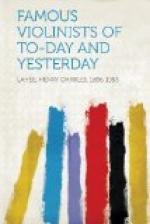This misfortune occurred in 1798, and Viotti retired to a small village called Schoenfeld, not far from Hamburg, where he lived in strict seclusion. During this time he was by no means idle, for he composed some of his finest works, notably the six duets for violins, which he prefaced by these words: “This book is the fruit of leisure afforded me by misfortune. Some of the pieces were dictated by trouble, others by hope.” It was also during this period of retirement that he perfected his pupil Pixis, who, with his father, lived at Schoenfeld a whole summer for the express purpose of receiving Viotti’s instruction.
In 1801 Viotti found himself at liberty to visit England once more, but when he returned he astonished the world by going into the wine business, in which he succeeded in getting rid of the remainder of his fortune. As a man of business the strictest integrity and honour regulated his transactions, and his feelings were kind and benevolent, whilst as a musician, he is said never to have been surpassed in any of the highest qualities of violin playing.
At the close of his career as a wine merchant, he returned to Paris to resume his regular profession, and was appointed director of the Grand Opera, but he failed to rescue the opera from its state of decadence, and, finding the duties too arduous for one of his age and state of health, he retired on a small pension. In 1822 he returned once more to England, where he passed the remainder of his life in quietude.
While travelling in Switzerland, and enjoying the beauties of the scenery, Viotti heard for the first time the plaintive notes of the Ranz des Vaches given forth by a mountain horn, and this melody so impressed him that he learned it and frequently played it on his violin. The subject was referred to by him with great enthusiasm in his letters to his friends.
There are numerous anecdotes about Viotti in reference to his ready repartee and to his generous nature. One of the most interesting is that concerning a tin violin. He had been strolling one evening on the Champs Elysees, in Paris, with a friend (Langle), when his attention was arrested by some harsh, discordant sounds, which, on investigation, proved to be the tones of a tin fiddle, played by a blind and aged street musician. Viotti offered the man twenty francs for the curious instrument, which had been made by the old man’s nephew, who was a tinker. Viotti took the instrument and played upon it, producing some most remarkable effects. The performance drew a small crowd, and Langle, with true instinct, took the old man’s hat and, passing it round, collected a respectable sum, which was handed to the aged beggar.
When Viotti got out his purse to give the twenty francs the old man thought better of his bargain, for, said he, “I did not know the violin was so good. I ought to have at least double the amount for it.”
Viotti, pleased with the implied compliment, did not hesitate to give the forty francs, and then walked off with his newly acquired curiosity. The nephew, however, who now arrived to take the old man home, on hearing the story ran after Viotti, and offered to supply him with as many as he would like for six francs apiece.




